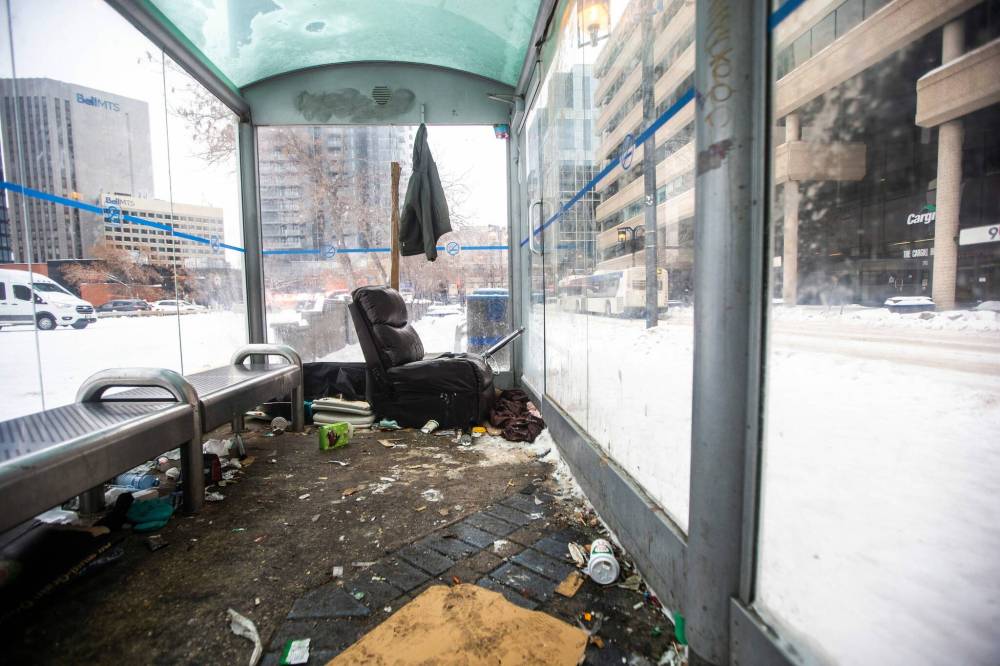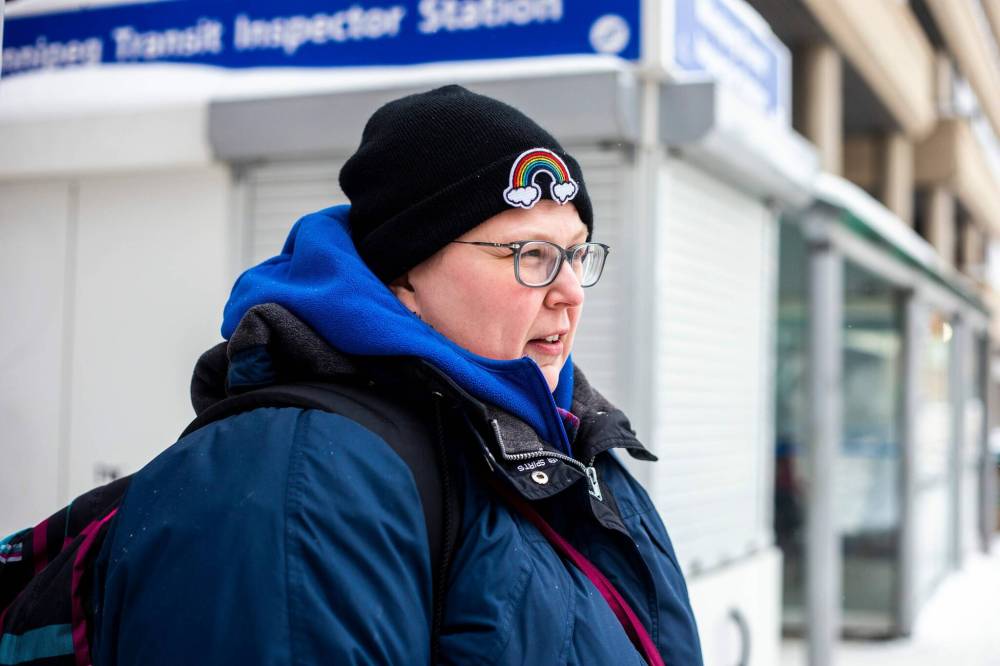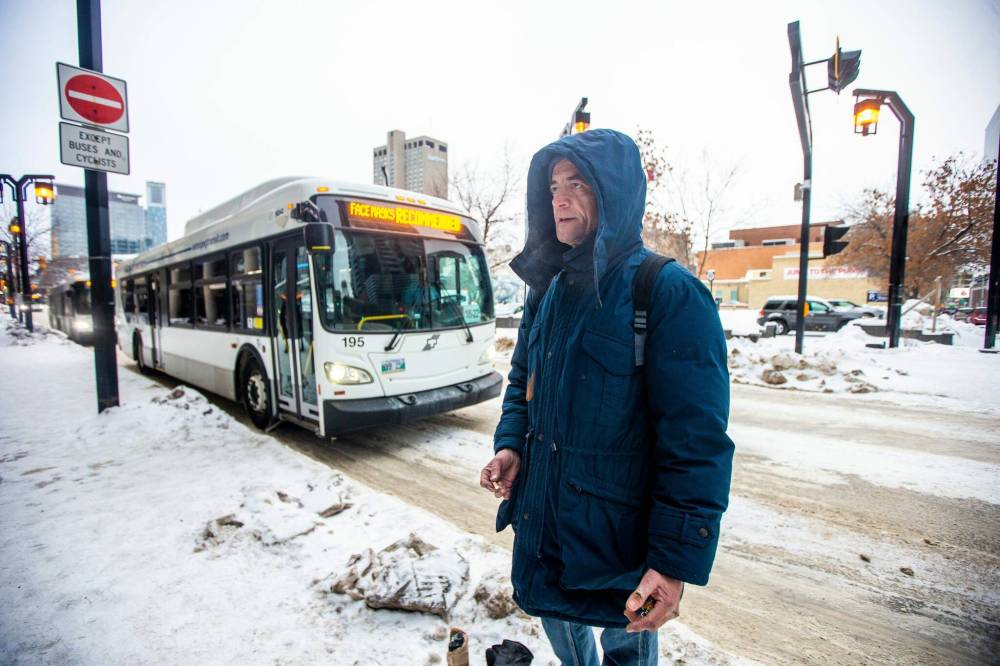‘It’s a horrible way to live… have a little understanding’
Homeless take refuge in bus shelters; riders left out in cold
Advertisement
Read this article for free:
or
Already have an account? Log in here »
To continue reading, please subscribe:
Monthly Digital Subscription
$0 for the first 4 weeks*
- Enjoy unlimited reading on winnipegfreepress.com
- Read the E-Edition, our digital replica newspaper
- Access News Break, our award-winning app
- Play interactive puzzles
*No charge for 4 weeks then price increases to the regular rate of $19.00 plus GST every four weeks. Offer available to new and qualified returning subscribers only. Cancel any time.
Monthly Digital Subscription
$4.75/week*
- Enjoy unlimited reading on winnipegfreepress.com
- Read the E-Edition, our digital replica newspaper
- Access News Break, our award-winning app
- Play interactive puzzles
*Billed as $19 plus GST every four weeks. Cancel any time.
To continue reading, please subscribe:
Add Free Press access to your Brandon Sun subscription for only an additional
$1 for the first 4 weeks*
*Your next subscription payment will increase by $1.00 and you will be charged $16.99 plus GST for four weeks. After four weeks, your payment will increase to $23.99 plus GST every four weeks.
Read unlimited articles for free today:
or
Already have an account? Log in here »
Hey there, time traveller!
This article was published 29/12/2022 (1076 days ago), so information in it may no longer be current.
Normand Bedard saw the writing on the wall long before he became homeless.
After three years of struggling to pay his bills and facing mental health challenges, he was evicted from his home in June 2021 and found himself living on the street.
“I lost my home, I lost my car, I lost everything… It felt like I was already dead. I felt like I didn’t deserve to live,” he said.

MIKAELA MACKENZIE / WINNIPEG FREE PRESS
A downtown Winnipeg Transit shelter on Graham Avenue.
The 57-year-old fought back tears as he recounted his life’s story outside a bus shelter near Graham Avenue and Fort Street on Tuesday. Inside, a person who appeared to be homeless slept beneath a mound of blankets on a bench.
The shelter was littered with garbage and a tattered sheet hung over one pane of glass. From the street, the stench of urine wafted through the door. Regular transit riders stood outside, far from the mess.
Multiple riders told the Free Press they seldom, or never, use the shacks because they are dirty and unsafe.
“There’s always messes and people living in there, but the less fortunate need to do what they can to survive,” said Jennifer Caryk, a rider whose daily route takes her downtown.
“It’s shameful that… we can’t take care of our own people in our city. Winter comes every year and there is always a scramble. Why can’t we put something up that’s ready for them?”
Caryk suggested vacant, city-owned lots could be converted to affordable housing.
Bedard agreed, saying any solution that does not include expanding affordable housing will be a “Band-Aid.”
“Yes, there’s people living in the shelters. It’s not by choice. They are living in hell in there,” Bedard said, gesturing toward the bus shack.
“It’s a horrible way to live. …We’re not here by choice. Things have happened to us that put us here. Have a little understanding.”
Bedard uses Winnipeg Transit daily, sometimes riding on as many as 10 buses to navigate between social resources, medical appointments and shelters.
He knows bus shacks can be messy and dangerous for transit riders, particularly downtown, but he said not all homeless people contribute to the problem and many of those who do are addicted to drugs, mentally unwell or are overwhelmed by desperation.
“They have no values or value for themselves left. So, if they don’t respect themselves, how do they respect others? Property is nothing, they trash it as they go along,” he said. “You become this different person when you live (homeless). Not someone you like, someone you want to leave behind as fast as you can.”
The City of Winnipeg website says there are 870 bus shacks; 121 of which are heated.
Five Winnipeg Transit workers are responsible for cleaning the majority of them. Each person handles 150 locations, with some needing to be cleaned up to three times per week, said Amalgamated Transit Union 1505 president Romeo Ignacio.

MIKAELA MACKENZIE / WINNIPEG FREE PRESS
“There’s always messes and people living in there, but the less fortunate need to do what they can to survive,” said Jennifer Caryk, a rider whose daily route takes her downtown.
At one time, the job involved picking up garbage and removing graffiti. Now, certain shacks require multiple staff and heavy equipment to remove debris, which can include drug paraphernalia, wheelchairs and furniture.
Two workers were cut from the cleaning crew in 2019.
The city partners with organizations such as the Downtown Winnipeg Business Improvement Zone to help clean select shelters, but it is nearly impossible to stay ahead, Ignacio said.
“We need more people and we need better equipment… Not only is the city spending more to clean the same number of bus stops, they are unable to provide the same level of service.”
A spike in security concerns has dealt a blow to morale and led to a staffing shortage at Winnipeg Transit, he said.
Ignacio credited Mayor Scott Gillingham for connecting with the Transit union to discuss its concerns as soon as he took office following the October election.
Earlier this month, The Canadian Press published data, obtained via a freedom-of-information request, that shows the city spent nearly $700,000 repairing damage to shacks caused by vandals from June 1, 2021, to Aug. 31, 2022.
It is unclear whether the figure includes cleaning expenses.
The city was unable to provide data Wednesday on how many unclean shelters were reported via the 311 system this year. Nor could it provide an estimate on what it spends to clean shelters each year.
“Clearly, we have some big problems to deal with when it comes to poverty, homelessness and addictions… it makes things really challenging when people are living out of bus shelters,” said Coun. Janice Lukes, chairwoman of the Transit advisory committee.
Lukes was elected to the committee, which reviews, assesses and recommends strategies to improve transit safety, this month.
She said her priority is to build partnerships with higher levels of government.
Although the province is responsible for housing and health, residents often look to the city for solutions. Winnipeg is working to improve outcomes for vulnerable people, but it has significant budget restrictions, Lukes said.
Brian Bowman, who was mayor until October, struggled to collaborate with the provincial government, which made it difficult for the city to get provincial support, Lukes said.

MIKAELA MACKENZIE / WINNIPEG FREE PRESS
Normand Bedard knows bus shacks can be messy and dangerous for transit riders, particularly downtown, but he said not all homeless people contribute to the problem and many of those who do are addicted to drugs, mentally unwell or are overwhelmed by desperation.
With Gillingham now at the helm, she is hopeful municipal, provincial and federal partners will come to the table to address the root causes of homelessness.
“The city cannot do this on our own…. Sometimes, when things are at their worst, people pull together. I cannot fathom things getting worse,” Lukes said.
Gillingham said this month finding homes for vulnerable citizens was among his priorities.
With funds from the federal government’s Rapid Housing Initiative, Winnipeg has distributed $25 million to affordable housing projects since 2020, resulting in the development of 134 new housing units.
The city is requesting non-profits, businesses, developers and citizens identify projects that qualify for the initiative and submit an initial expression of interest that explains their project before Feb. 3, 2023.
To qualify, developments must have a minimum of five units and meet all program requirements, including affordability as defined by the Canada Mortgage and Housing Corp.
Nine vacant lots are currently advertised for sale on the city’s website, including four properties reserved for affordable housing. The latter can only be purchased by non-profits or affordable housing developers.
The 2022 Winnipeg Street Census found at least 1,250 people in Winnipeg do not have housing. The number is a conservative estimate; the true number might include an additional 4,000 people, the report said.
“It’s not just the city’s fault. It’s a problem that we all share as citizens of Winnipeg. We all have to figure this out together… It will take a group of thousands getting together to solve this, because there are thousands of homeless,” Bedard said.
tyler.searle@freepress.mb.ca
History
Updated on Thursday, December 29, 2022 12:07 PM CST: Clarifies Normand Bedard lost his home in June 2021






